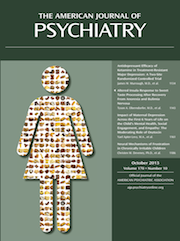Corrections
and“The values observed in our study group were compared with the population statistics from the Centers for Disease Control and Prevention (www.cdc.gov/growthcharts/clinical_charts.htm) (Figure 2). The median length and weight measurements in all exposure groups were within the interquartile range (25th to 75th percentiles) of the general population of infants; therefore, the study group is reasonably similar to the general population. The median head circumferences were within the interquartile range for all exposure groups with two exceptions: infants with no exposure or exposure to MDD exceeded the 75 th percentile at 52 weeks of age.”
“No significant association between prenatal SSRI or depression exposure and growth in weight, length, or head circumference was observed. The unadjusted analysis revealed no association of prenatal exposure to weight (p=0.84), length (p=0.40), or head circumference (p=0.16). After we controlled for the characteristics that differed between exposure groups (race, education, employment, marital status, parity, presence of lifetime anxiety disorder, infant sex, and preterm birth) and included presence of depression at each postpartum time point, no significant association of exposure with weight (p=0.40), length (p=0.76), or head circumference (p=0.72) was observed. In addition, because maternal body weight affects aspects of infant growth, we evaluated the interaction of group and prepregnancy BMI, which was also nonsignificant, and no synergistic effect was identified for weight (p=0.79), length (p=0.81), or head circumference (p=0.97).”
Supplementary Material
- View/Download
- 235.34 KB
Information & Authors
Information
Published In
History
Authors
Metrics & Citations
Metrics
Citations
Export Citations
If you have the appropriate software installed, you can download article citation data to the citation manager of your choice. Simply select your manager software from the list below and click Download.
For more information or tips please see 'Downloading to a citation manager' in the Help menu.
View Options
View options
PDF/EPUB
View PDF/EPUBGet Access
Login options
Already a subscriber? Access your subscription through your login credentials or your institution for full access to this article.
Personal login Institutional Login Open Athens loginNot a subscriber?
PsychiatryOnline subscription options offer access to the DSM-5-TR® library, books, journals, CME, and patient resources. This all-in-one virtual library provides psychiatrists and mental health professionals with key resources for diagnosis, treatment, research, and professional development.
Need more help? PsychiatryOnline Customer Service may be reached by emailing [email protected] or by calling 800-368-5777 (in the U.S.) or 703-907-7322 (outside the U.S.).

